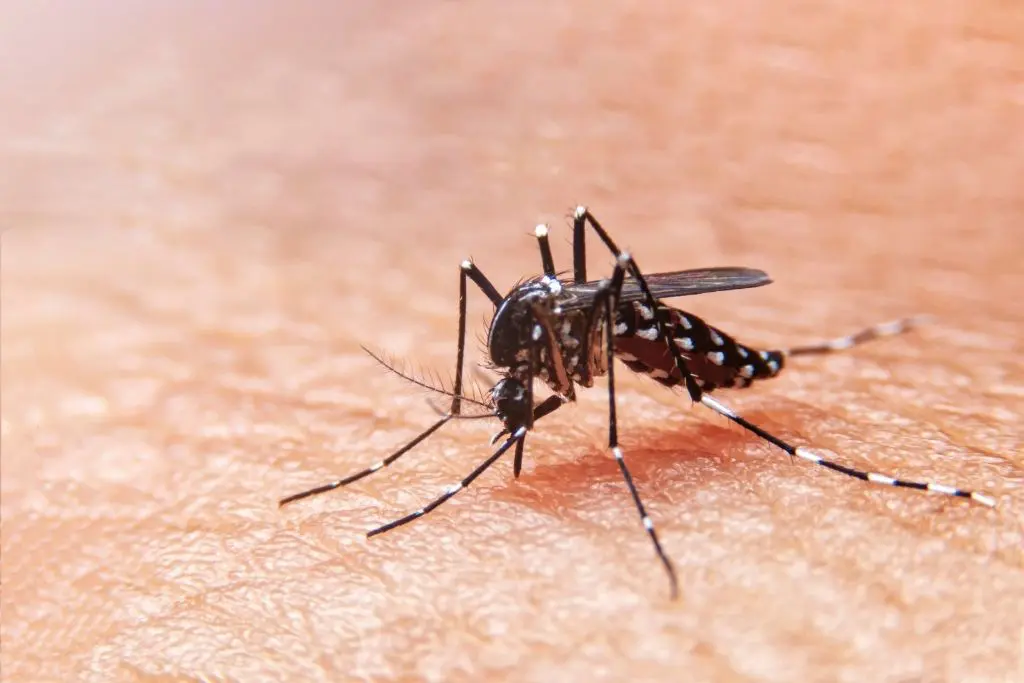Tropical mosquitoes capable of carrying deadly viruses have been intercepted at a busy motorway service station in Kent and a freight terminal near Heathrow Airport. The discoveries have raised new fears about the UK’s climate and border security.

This is worrying news for public health officials.
The insects, known carriers of Dengue, Zika, and Chikungunya viruses, were found as part of a UK-wide monitoring scheme. Experts warn that the arrival of these pests means the threat of established, disease-carrying mosquito populations in Britain is now a “tangible risk.”
The UK Health Security Agency (UKHSA) stresses that while the current danger to the public is low, the incidents highlight how global trade and warming temperatures are bringing exotic health threats ever closer to home.
Two Dangerous Mosquitoes Are Here
Two distinct types of non-native mosquitoes have been identified in the surveillance report. Both are considered among the world’s most invasive.
The most widely reported is the Asian Tiger mosquito (Aedes albopictus). This pest has distinctive black and white striped legs and body. It is particularly concerning because it is highly adaptable and thrives in urban gardens, laying eggs in small puddles of water.
The second is the Egyptian mosquito (Aedes aegypti). This species is a primary carrier of Yellow Fever and Zika virus.
Unlike native British mosquitoes, both the Tiger and Egyptian species are known to bite aggressively during the day, increasing the risk of virus transmission.
Where the Pests Have Landed
The UKHSA surveillance focused on key points of entry, where goods and passengers arrive from mainland Europe and the rest of the world.
The eggs of the Asian Tiger mosquito were discovered in August 2024. They were found in a trap at a major motorway service station in Kent. This is a major gateway for vehicles crossing the Channel.
A separate discovery involved the Egyptian mosquito. Its eggs were found inside a freight storage facility close to London’s Heathrow Airport in September 2023. This shows that air cargo and international shipping are major risk routes for these pests.
Why the UK is Now at Risk
These types of mosquitoes were once limited to hot, tropical regions. But that is rapidly changing.
The reason for their northward spread is clear: climate change.
Milder winters in the UK are no longer guaranteed to kill off the eggs laid by these invasive species. Longer, warmer summers also allow the mosquitoes to breed more quickly. This gives them a much greater chance of forming permanent, established colonies.
This scenario is not theoretical. It is already happening across the Channel.
The Asian Tiger mosquito is now well established throughout large areas of southern and central Europe, including parts of France, Italy, and Spain. Crucially, its presence has led to small outbreaks of Dengue and Chikungunya fever that were acquired locally, not abroad.
In fact, the UKHSA notes that the London area specifically is moving towards a climate model that could sustain the Tiger mosquito year-round. It’s a pressing concern.
The Viral Threat Explained Simply
The greatest fear is local virus transmission.
Currently, all cases of Dengue, Zika, and Chikungunya found in the UK are imported—they are caught by travellers while overseas.
For a local outbreak to happen, a chain of events must be set in motion. An invasive mosquito must first bite a tourist who is infected with Dengue. That mosquito is now carrying the virus. If it then bites a healthy resident, the disease is passed on, leading to the UK’s first locally acquired case.
Colin Johnston, the senior mosquito expert at the UKHSA who led the study, confirmed that rapid action has been essential.
“Each detection triggered enhanced local monitoring and control measures,” Mr Johnston said. “The fact that no further specimens were found suggests these were isolated arrivals. This shows our fast response is working.”
The UK’s Emergency Plan
The discovery of the eggs is viewed as a success for the UKHSA’s intensive surveillance programme. They have thousands of traps (called ovitraps) set up across airports, ports, and motorway hubs to catch any incoming insects.
When a positive finding is confirmed, the government’s emergency plan is immediately launched.
Local Environmental Health Officers (EHOs) work quickly with the UKHSA team. They inspect a wide area around the detection site to find any and every possible breeding spot.
This means thoroughly searching for, and removing, standing water. Old tyres, flowerpot saucers, and even plastic sheeting can hold enough water for the mosquito eggs to hatch. Where water cannot be removed, special anti-larval products are used to kill the pests before they can grow into adults.
This quick, aggressive response is the country’s main defence. It prevents the mosquitoes from settling long enough to breed in high numbers.
Simple Steps to Protect Your Garden
The public is critical to the defence strategy. The Asian Tiger mosquito loves to breed in small, man-made containers often found in back gardens and outside homes.
Homeowners can drastically reduce the risk of a mosquito colony setting up shop nearby by taking simple steps, especially during the summer months:
- Empty Water: Regularly empty any outside item that can hold still water, such as buckets, toys, and plant saucers. Do this at least once a week.
- Cover Tightly: Ensure water butts, bins, and other storage containers are securely covered so mosquitoes cannot get inside to lay eggs.
- Clear Blockages: Check and clear blocked guttering and outdoor drains where rainwater might collect.
The UKHSA encourages everyone to stay vigilant. By keeping gardens clear of standing water, the public is providing the UK’s best defence against the growing threat of these dangerous, invasive insects.




